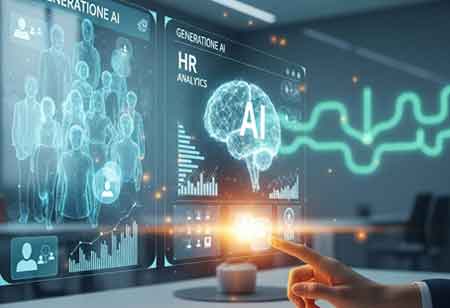THANK YOU FOR SUBSCRIBING
Be first to read the latest tech news, Industry Leader's Insights, and CIO interviews of medium and large enterprises exclusively from Hrtech Outlook
THANK YOU FOR SUBSCRIBING

By
HR Tech Outlook | Monday, August 11, 2025
Stay ahead of the industry with exclusive feature stories on the top companies, expert insights and the latest news delivered straight to your inbox. Subscribe today.
Organizations no longer remain static, for their human resources constantly evolve daily in their resource management options. Generative AI is one such example among the recent avant-garde technologies equipping human resources managers with tools enabling efficiency, accuracy, and personalization for managing workforce resources. Many top HR tech companies have recognized this newfound potential, integrating the technology into their platform to optimize recruitment, employee development, and operational processes. These solutions do not replace human expertise; they only augment the capabilities of HR professionals to enable them to focus on strategic priorities and employee engagement.
Transforming Recruitment and Talent Acquisition
Recruitment is one of the most tedious and crucial functions within HR. Generative AI provides new efficiencies by automating most manual tasks that demanded considerable effort on the part of people. Through an advanced method of data analysis and natural language processing, it can read vast amounts of candidate information and provide detailed summaries relevant to skills and experience. Automatic screening identifies the most suitable applicants much faster and reduces the fault probability originating from manual scanning by an HR administrator.
Moreover, generative AI creates job descriptions that demonstrate more relevance to the logic of what the market demands and the job needs. By analyzing the hiring trend and finding patterns from successful profiles, AI creates content to draw in the right candidates, making job postings highly effective in attracting qualified candidates. AI-powered chatbots also help with the first stage of engagement with candidates by providing answers to common questions stemming from applicants and collecting necessary details, thus allowing HR professionals to spend more time conducting meaningful interviews and building relationships.
The system reduces unconscious bias by emphasizing objective criteria built from data rather than subjective impressions, which could result in a fairer recruitment process and more diverse workplace environments. Recruitment, with generative AI, is not merely one that entails human judgment but a data-informed process for improving overall hiring results.
Enhancing Development and Engagement of Employees
Human resources do not stop at recruitment; they include employee development and performance evaluation, employee communication, and even engagement. Generative AI analyzes employee feedback, performance metrics, and communication patterns before offering actionable insights to HR. This helps them understand the workforce sentiment and spot areas of improvement in morale versus productivity.
Performance evaluation can benefit from AI-generated reports that compile quantitative metrics and qualitative feedback into clear summaries. In so doing, managers are aided in conducting more objective reviews and creating individualized development plans concerning strengths and areas of improvement among employees. In addition, AI can suggest on-the-job training programs whereby skill gaps are identified, and learning resources that fit employees are matched. As such, continuous professional growth is advanced while overall organizational capability improves.
Generative AI understands engagement in creating internal communication content like newsletters, policy changes, and motivational messages compatible with the company culture. The art of automating content production to keep it relevant underwrites a state of transparency and real-time information among those employees. Furthermore, AI-assisted platforms support ongoing dialogue between and amongst staff and management so that issues may be raised and reactions garnered in real time.
Optimizing Human Resource Operations and Compliance
Generative AI assists in automating and improving efficiency for regular HR operations and legal compliance. Administrative tasks like drafting employment contracts, generating policy documents, and managing payroll can be done using AI-generated, accurate, and standardized content. This lightens the administrative load on HR teams while reducing the probability of error occurrence.
Generative AI helps with compliance. For example, it tracks daily labor laws, tax regulations, and workplace standards changes. It creates alerts and documents necessary for an organization to keep pace with the newest rules and legal obligations. This proactive measure curtails non-compliance risks and supports ethical HR management.
Data privacy and security remain paramount in HR, as employee information is sensitive. Generative AI platforms use encryption and access measures to secure confidential data. Besides, these systems leave detailed audit trails, which ensure transparency and accountability, particularly with the trend toward more stringent regulations around data protection.
Combining generative AI with advanced analytical and other automation technologies will allow for possible future enhancements. AI-driven predictive analytics, for instance, may forecast workforce trends and be the basis for HR strategic planning for recruitment and retention. Automation, however, would save even more time from repetitive tasks, freeing up HR lines to focus initially on high-impact tasks.



